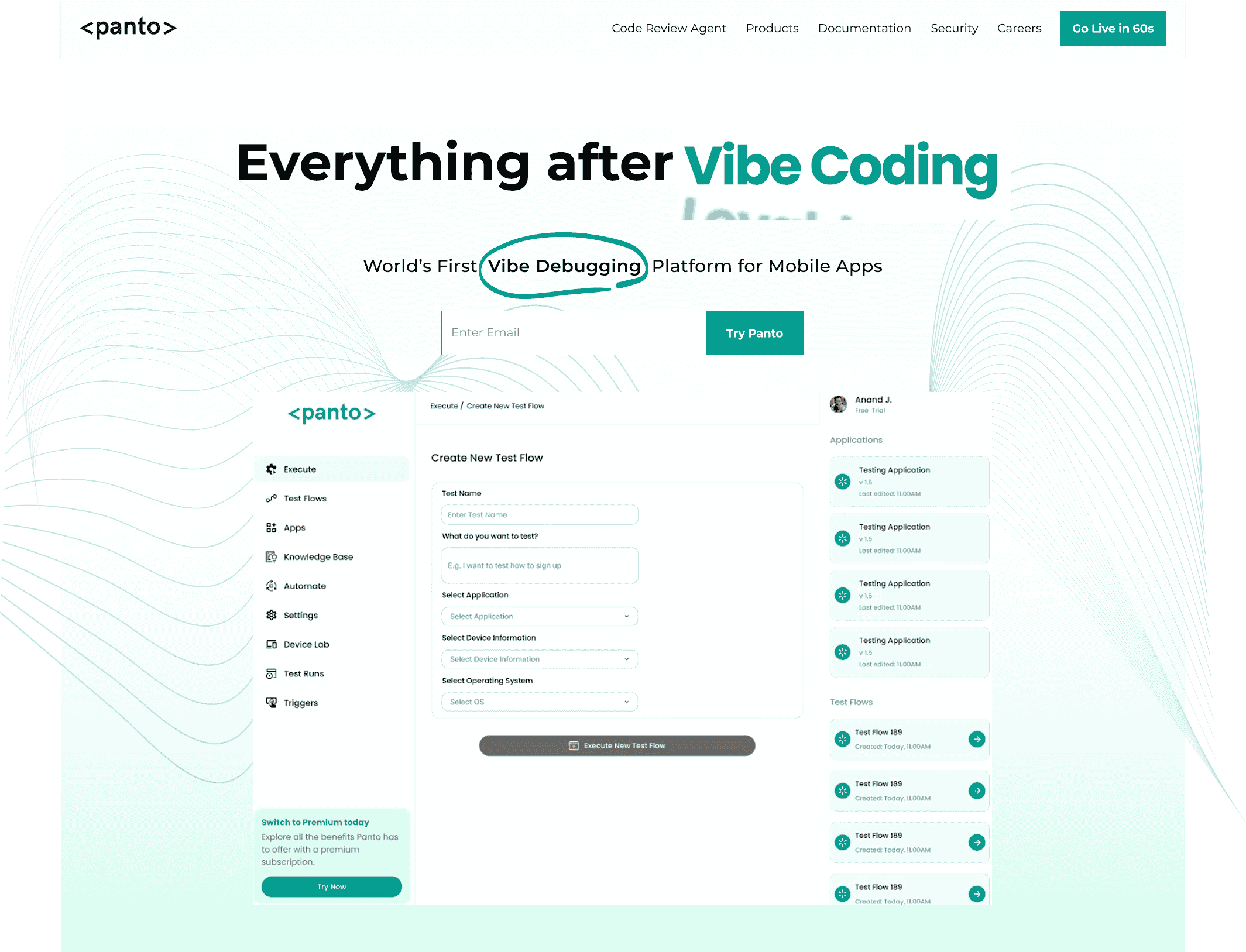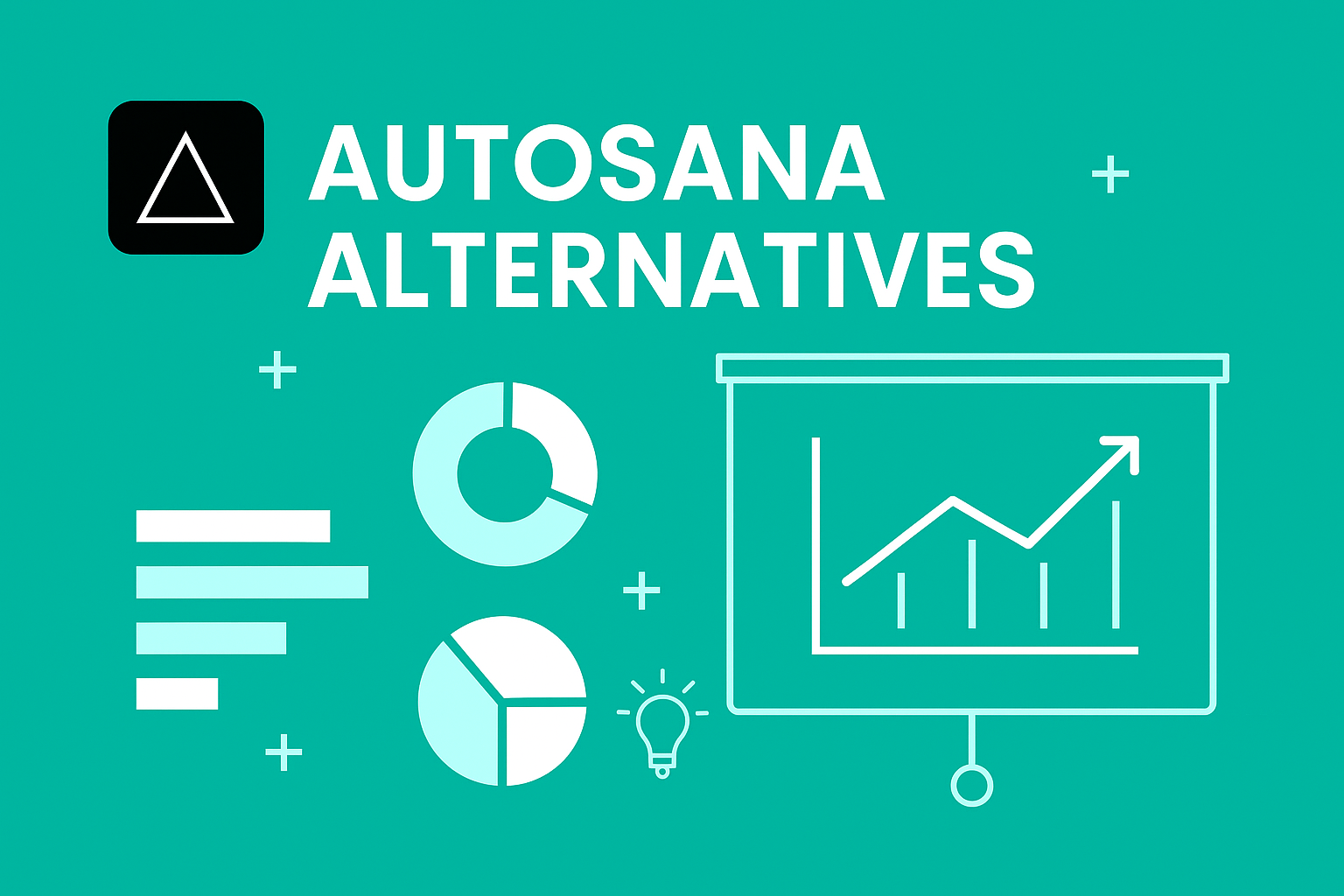As mobile app testing continues to evolve, teams are increasingly seeking intelligent automation solutions that go beyond traditional scripting. While Autosana has carved a niche as an AI-powered QA agent for mobile testing, the landscape is rich with powerful Autosana alternatives.
If you’re looking for advanced features, better pricing flexibility, or specific platform support, this comprehensive guide explores the top 10 AI-powered Autosana alternatives that rival and complement Autosana’s capabilities.
Top 10 Autosana Alternatives for Mobile App Testing
1. Panto AI

Overview
Panto AI QA is a next-generation mobile app testing platform built to simplify and accelerate QA automation. Panto’s AI agent intelligently navigates apps based on natural language instructions, breaking down complex features and user flows step by step to execute on real devices. From this execution, the platform automatically generates deterministic test scripts that are library agnostic, supporting Appium, Maestro, and raw script formats.
With seamless integration into BrowserStack and LambdaTest, teams can instantly execute tests on real device farms or trigger CI/CD-based regression runs. Panto’s self-healing scripts adapt to frequent UI changes without manual intervention, significantly reducing maintenance effort and QA overhead.The platform is designed as a no-code automation experience, delivering a lovable approach but for Vibe Debugging, where testers and PMs can automate complex mobile app flows in minutes. As the only solution that blends true no-code testing, AI-powered agent execution, and deterministic script generation, Panto AI QA as one of the Autosana alternatives makes mobile QA scalable, easy to use, and future ready.
Key Features
Panto AI’s strength lies in its self-healing automation, which adapts to UI changes automatically without manual updates. The platform generates smart test cases from natural language, understands organizational context, and executes tests on real devices or emulators. Its comprehensive reporting includes step-by-step debug information with logs, videos, and screenshots delivered directly to Slack or your dashboard.
The platform supports all major mobile frameworks including Flutter, React Native, Swift, and Kotlin. It achieves 100% test coverage in a fortnight, and integrates seamlessly with CI/CD pipelines through webhooks and pull request triggers.
2. Maestro

Overview
Maestro is an open-source mobile UI testing framework designed for simplicity, stability, and speed. It revolutionizes mobile testing by using human-readable YAML files instead of complex programming logic, making it accessible to teams without deep technical expertise.
Key Features
Maestro’s primary advantage is its lightweight YAML-based approach, eliminating the need for complex configuration or coding knowledge. The framework provides built-in support for gestures, deep links, biometric testing, and network condition simulation. It runs on iOS, Android, React Native, Flutter, and WebViews with virtually no flakiness issues.
Execution speed is a significant differentiator—Maestro delivers test results in minutes compared to hours with traditional frameworks. Teams report 3x faster test creation compared to Selenium, with zero maintenance overhead for UI changes.
3. Sofy

Overview
Sofy is an all-in-one testing platform that combines AI-powered testing automation with real device testing, eliminating 40% of the time QA teams waste on device setup and management. The platform reduces QA time from days to just a few hours with zero coding required.
Key Features
Sofy’s low-code test automation enables any team member to create test cases, regardless of technical expertise. The platform provides access to 100+ real Android and iOS devices, automatically picks optimal device matrices, and executes tests in parallel. Its SofySense AI module, powered by OpenAI, generates manual test steps and provides intelligent insights for continuous improvement.
The platform automatically detects and reports issues, with support for all CI/CD platforms. Teams report 90% reduction in QA time and successfully automate complex scenarios within just one month.
4. Kobiton

Overview
Kobiton is a cloud-based mobile testing platform that delivers a “device-in-hand experience from anywhere.” It combines real device access with AI-powered automation capabilities, offering both manual and automated testing in one platform.
Key Features
Kobiton provides access to a broad range of real devices for 50% market coverage with just 10 devices, scaling to 159 devices for 90% coverage. The platform features AI-driven issue detection that automatically identifies critical issues like crashes and bottlenecks. Its Appium script generation delivers 3x faster script execution, and self-healing automation adapts to app changes automatically.
The session explorer provides an immersive “iMovie-like” experience to review test execution, rapidly pinpoint issues, and assign defects. Parallel execution significantly reduces testing time while maintaining high accuracy across all device types.
5. TestRigor

Overview
TestRigor pioneered plain-English test automation, allowing anyone on the team to create stable tests without coding. Its generative AI capabilities enable 50x faster test creation compared to Selenium while reducing test maintenance by 200x.
Key Features
TestRigor’s unique strength is its plain-English test syntax, making automation accessible to non-technical team members. The platform supports web, mobile, desktop, and API testing with self-learning capabilities that adapt to UI changes. Tests are created from the end-user’s perspective, eliminating reliance on fragile locators.
Parallel execution on the cloud device farm ensures quick turnaround times. The platform integrates with CI/CD tools like Jenkins and GitLab, offering rich reporting with screenshots and video logs. Teams report achieving 90% test coverage within a year.
6. Tricentis Testim

Overview
Tricentis Testim is an AI-powered SaaS platform that modernizes test automation through intelligent test creation and maintenance. It excels at making tests stable and maintainable, even as applications evolve rapidly.
Key Features
Testim’s AI-based Smart Locators make tests resilient to UI changes, with auto-improving locators that adapt over time. The platform offers next-level recordings that capture user interactions, automatically identifies and locks elements, and suggests reusable components to improve test architecture.
It supports web, mobile, and API testing with seamless CI/CD integration. The platform reduces regression testing time by up to 70%, according to case studies, and provides comprehensive test insights through an intuitive dashboard.
7. ACCELQ

Overview
ACCELQ is positioned as the only true codeless mobile test automation platform, unified for web, mobile, API, and backend testing without any coding required. It’s designed specifically for enterprise-scale automation at speed.
Key Features
ACCELQ’s zero-setup, cloud-native approach enables tests across mobile OS and devices without installation overhead. The platform offers intelligent Mobile Object handling that eliminates test flakiness through self-healing element identification. Its unified, OS-agnostic approach maintains a central object repository for iOS and Android, reducing maintenance significantly.
Smart test management includes automated test planning, full version control with branching, and dynamic impact analysis. Parallel execution ensures quick turnarounds, with comprehensive integrations supporting CI/CD pipelines and enterprise tools.
8. Katalon Studio

Overview
Katalon Studio is a comprehensive test automation platform with flexible pricing ranging from free to enterprise plans. It supports web, mobile app, desktop, and API testing with both low-code and full-code options, making it suitable for teams of all technical levels.
Key Features
Katalon offers dual automation approaches through low-code visual testing and full-code scripting with Java, C#, Python, and other languages. Its AI-powered capabilities include StudioAssist testing copilot and self-healing locators. The platform supports cross-browser testing with a reusable object repository, reducing maintenance overhead.
Pricing starts at free forever, with Premium plans at $2,199/year and custom Enterprise options. The platform integrates with major CI/CD tools and provides unlimited parallel test execution for Premium and Ultimate plans. Its large ecosystem and community support make it accessible for teams at any stage.
9. Ranorex Studio

Overview
Ranorex Studio is a comprehensive QA automation testing tool with powerful mobile testing capabilities. It supports native, hybrid, and web applications across iOS and Android with advanced object recognition technology.
Key Features
Ranorex’s strength lies in its advanced object recognition using RanoreXPath query language, making tests robust against UI changes and reusable across different screen sizes. The platform supports testing on real devices wirelessly or over USB without requiring jailbreak. It offers both codeless UI testing and coded automation through C# or VB.NET APIs.
The tool provides comprehensive reporting with pie charts, logs, and screenshots, enabling rapid debugging. Integration with Jenkins and CI/CD pipelines ensures smooth continuous testing. Ranorex supports React Native applications and offers design-once-run-everywhere capability across multiple devices.
10. LambdaTest KaneAI

Overview
LambdaTest‘s KaneAI is an AI-native cloud testing platform that generates, debugs, and evolves test cases using natural language commands. It provides access to 10,000+ real devices for comprehensive cross-browser and cross-device testing.
Key Features
KaneAI’s conversational AI interface enables rapid test creation through natural language prompts. The platform supports both manual and automated testing across Android and iOS devices. Parallel execution significantly reduces testing time while maintaining accuracy across diverse device configurations.
The tool integrates seamlessly with major CI/CD platforms and provides advanced debugging capabilities with real-time monitoring. Teams benefit from zero local setup requirements and instant access to the latest mobile devices and OS versions. Comprehensive analytics provide actionable insights for continuous quality improvement.
Comparison Table of Autosana Alternatives
| Autosana Alternative | Platforms | Pricing | Test Creation Speed | Self-Healing | Real Devices | Code Required | Best For |
|---|---|---|---|---|---|---|---|
| Panto AI | Flutter, React Native, Swift, Kotlin | Custom Pricing | 50x faster | Yes (Automatic) | Yes | No | Context-aware code review + QA |
| Maestro | iOS, Android, React Native, Flutter, Web | Free/Open Source | 3x vs Selenium | Automatic Sync | Via Cloud | YAML only | Lightweight, stable automation |
| Sofy | iOS, Android | Custom Pricing | 90% time reduction | Yes | 100+ devices | No | Real device cloud + AI insights |
| Kobiton | iOS, Android | $83-125/month | 3x faster scripts | Yes (Self-healing) | Real device cloud | Optional | Enterprise-scale real testing |
| TestRigor | Web, Mobile, Desktop, API | Custom Pricing | 50x vs Selenium | Yes (99% less maintenance) | Cloud farm | Plain English only | Non-technical automation |
| Tricentis Testim | Web, Mobile, API | Custom Pricing | 10x faster | AI Smart Locators | Real devices | No-code/Code hybrid | Rapid test stability |
| ACCELQ | Web, Mobile, API, Desktop, Backend | Custom Pricing | Zero setup | Self-healing element ID | Real + Cloud | No | Enterprise unified platform |
| Katalon Studio | Web, Mobile, Desktop, API | Free – $2,199/year | Low to moderate | Adaptive locators | Integrated cloud | Low-code/Full-code | Teams of any size |
| Ranorex Studio | iOS, Android, Web, Desktop | Custom Pricing | Moderate | RanoreXPath adaptive | Real + Emulators | Codeless + C#/VB.NET | Advanced object recognition |
| LambdaTest KaneAI | iOS, Android | Custom Pricing | Rapid via AI | Yes | 10,000+ devices | Natural language | Cloud-first QA teams |
Choosing the Right Autosana Alternative for Your Needs
For Budget-Conscious Teams
Maestro stands out as the most cost-effective option, being entirely free and open-source while delivering professional-grade automation. Katalon Studio’s free forever plan also provides substantial functionality for growing teams without initial investment.
For Enterprise Organizations
ACCELQ, Kobiton, and LambdaTest KaneAI offer enterprise-grade features with comprehensive real device labs, advanced analytics, and dedicated support. These platforms scale effortlessly and integrate deeply with enterprise CI/CD pipelines.
For Speed and Accessibility
TestRigor and Panto AI excel at making automation accessible to non-technical team members through plain English and natural language interfaces. Teams report achieving high test coverage remarkably quickly with minimal coding knowledge required.
For Advanced Object Recognition
Ranorex Studio and Katalon Studio provide superior locator strategies that handle dynamic UIs effectively. Their advanced element identification makes tests resilient to frequent UI changes, essential for rapidly evolving applications.
For All-In-One Solutions
Panto AI uniquely combines code review, security scanning, and AI-driven QA automation, making it ideal if you need unified quality assurance. ACCELQ and Sofy similarly offer comprehensive platforms covering multiple testing dimensions.
Conclusion
The mobile QA landscape has evolved dramatically, offering teams multiple pathways to achieve high-quality automation. While Autosana provides solid AI-powered capabilities, these Autosana alternatives each bring unique strengths.
Your choice depends on your team’s technical expertise, budget constraints, scale requirements, and specific debugging challenges. Start by identifying your highest priority: rapid test creation, extensive real-device testing, ease of use, or enterprise integration.






